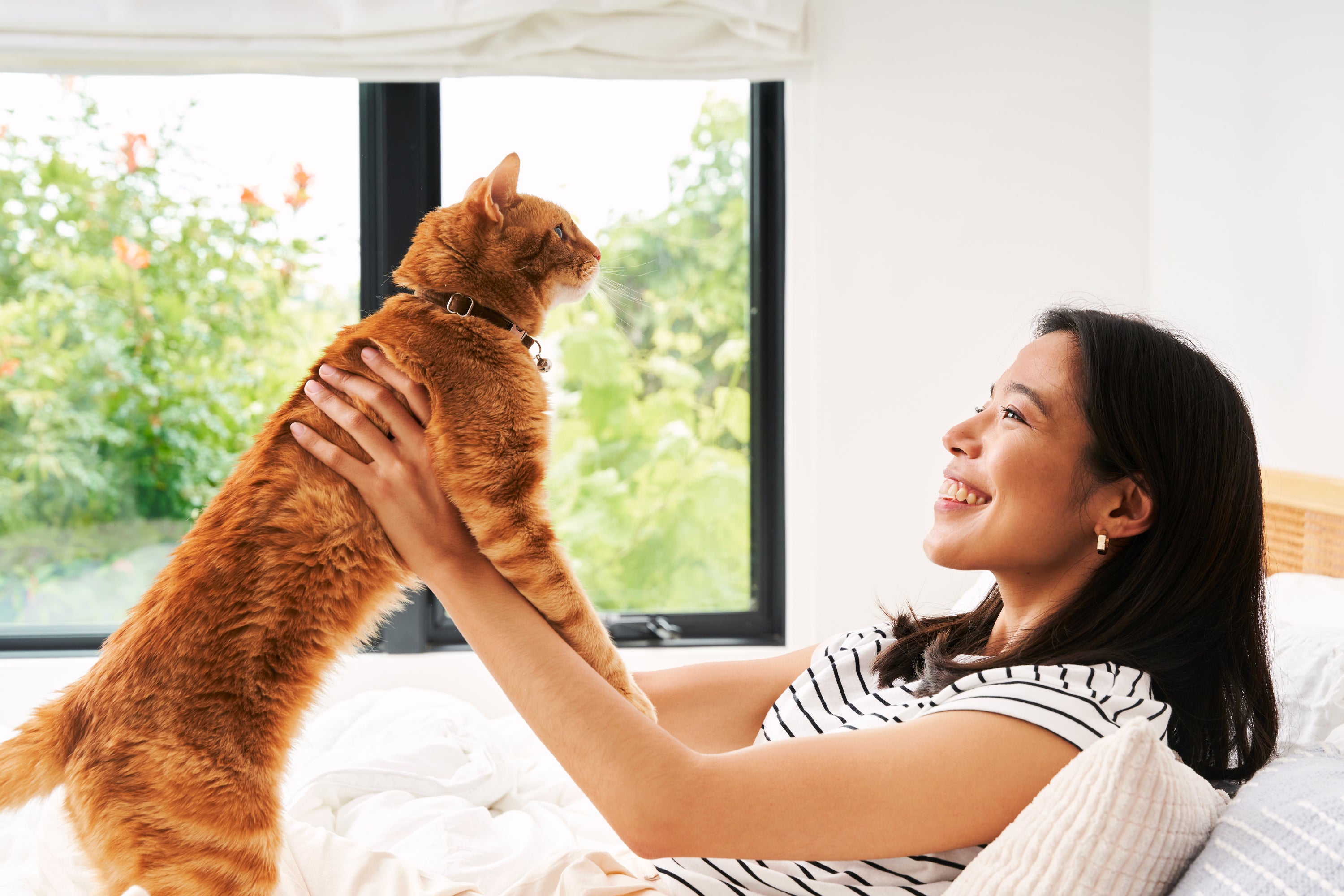
How long do cats live? Here’s what to expect.
How long do cats live? Here’s what to expect.
Some say that cats are not for everyone. That may be true, but once you fall in love with a kitten, you're smitten. One of the greatest joys of owning a cat is feeling them curl up on your lap while you're relaxing on the couch after a long day. This simple, yet meaningful act sums up what’s great about being a cat parent—having a furry companion who’s loyal, loving, and always there for you in their own quiet way.
As much as we may want them to, cats don’t live forever. Their lifespan is ultimately determined by several different factors such as their lifestyle, diet, breed, and health. Let's take a close look at each of these factors and the life stages your cat goes through. By understanding their lifespan and the things that affect it, you can potentially prolong your time with them through healthy, preventative practices.
The average lifespan of a cat is 12 years for a female and 11 years for a male cat, showing female cats tend to live longer than male cats. However, it’s not uncommon for cats to live longer than this. The gap between their life expectancy tends to shrink between 15–16 years.
Another interesting factor is that crossbred cats tend to have a longer lifespan than purebreds. Crossbred cats have a 1.5 year longer life expectancy than purebred cats.
Factors Affecting Your Cat’s Lifespan
Let’s take a deep dive into all the factors that affect your pet’s lifespan. By understanding each factor, you’ll be better equipped to give your cat the loving care they deserve.
Indoor vs. Outdoors
How does your cat like to spend their day? Are they masters of their domain, relaxing inside the house with everything they need to keep them happy? Maybe they’re more of a feline floater who likes to get out of the house and explore the area around them. Every cat has its unique style, but this is one of the factors that affect their lifespan.
Statistics show that cats who spend more time outdoors tend to have a shorter life expectancy than cats who stay indoors, with cats who spend time inside and outside landing in the middle.
Many factors contribute to this. Unrestricted outdoor access for cats poses multiple risks to their health such as diseases, parasites, traffic dangers, predation, and becoming lost. However, even if you keep your cat inside, it’s important to give them a healthy diet with the right portions and the opportunity to exercise regularly. This helps them stay fit and healthy without becoming obese and overly sedentary.
Diet
Giving your cat a healthy diet goes far beyond just filling up their bowl and letting them chow down. In recent years, pet obesity has been on the rise, and your cat might be suffering without you knowing.
According to a 2023 survey by the Association for Pet Obesity Prevention (APOP), only 28% of cat owners knew that their pets were obese, and 70% considered their pet's weight to be healthy. However, when we take a closer look, we see these numbers don’t match up with reality. The APOP conducted a study in 2022 that found 61% of cats to be overweight or obese. Unfortunately, most pet parents are unaware their cat is on the heavier side.
We might think a bit of plumpness makes kitty look adorable, but obesity can cause serious health problems for your pet. For example, it can put your pet at a greater risk of dermatological issues, diabetes mellitus, neoplasia, and urolithiasis.
Much like it is with humans, obesity causes increased insulin resistance and impaired glucose metabolism in cats and dogs. For cats, this resistance can lead to feline diabetes.
Breed
Depending on their breed, your cat may have a longer or shorter lifespan. Some cat breeds have been shown to have a longer life expectancy than other breeds. For example, Burmese and Birman cats have been shown to have the longest life expectancy at 14. 42 and 14.39 year, respectively. Sphynx cats were found to have the shortest life expectancy at 6.68 years. Purebred cats with a non-ideal body weight were significantly linked to a decreased lifespan.

The Life Stages of Your Cat
As cats grow and experience the world, they go through different stages of life with different behavioral and health needs in each stage. The four stages go from kitten to young adult to mature adult to senior. Let's look at each stage to see how you can best care for your cat depending on their life stage.
Kitten (Birth–1 Year)
As cute and cuddly as kittens are, their main job is to grow and learn how to interact with their environment. This is a playful stage because your kitten wants to play and learn how everything around them works. It also comes with plenty of challenges because it involves training your kitten on where to go to the bathroom, so they don’t leave you a nasty surprise somewhere in the house.
Another thing to remember is that it’s important for kittens to get plenty of socialization so they learn appropriate behavior around people and other cats.
Kittens also have unique nutritional needs because they consume more calories than older cats. The higher calorie intake helps sustain their rapid growth and playful activities. Look for cat food that’s specifically made for growing kittens.
This is also the best time to vaccinate your kittens to protect them from rabies and other diseases.
Young Adult (1–6 Years)
This is when your beloved cat begins to enter its prime. These cats still love to be playful and active, but they’re no longer growing physically like when they were kittens. This means that they need less calories and they’re ready to start eating adult cat food. With these changes to their diet, it’s important to make sure you're tracking their portion sizes to avoid overfeeding or underfeeding them. Overfeeding your cat can lead to feline obesity, which can lead to different health issues that no cat or cat parent wants to deal with.
Remember to keep up with your cat's veterinarian checkups, so you can catch any diseases or ailments your cat may be developing.
Mature Adults (6–10 Years)
This is when your furry friend starts to slow down a little and show their years. They tend not to play as often and begin transitioning to a more sedentary lifestyle. You might notice your cat putting on some weight, so consider lowering their portion size to keep them from becoming obese. Even though they are less active, encourage them to get enough exercise and activity to stay fit and healthy.
Don't forget to keep an eye on their grooming behavior and weight changes as they get older. Make sure you pay attention to their oral health. At this age, you might want to consider dental cleanings, especially if your cat doesn’t like regular tooth-brushing.
Senior (10+ Years)
This is when your cat starts to enter their golden years, and this stage looks different for every cat. Some cats stay fit and active while others become more sedentary. A common recommendation is to have cats over 10 years old get their bloodwork and urine tested every 6 months. The older your cat gets, the more prone they’ll become to illnesses and other ailments.
As always, the best way to determine how to care for your pet at any age is to consult with your veterinarian.
How to Help Your Cat Live Longer
While we all wish there was some easy way to make our cats live forever, old age is unavoidable. Don’t despair, there are various steps you can take to help increase your cats' chances of a longer, healthier life.
Don’t Forget Preventative Care
Apart from a healthy diet, keeping up with your cat’s regular checkups is vital. An appointment with your veterinarian can go a long way in preventing illness from sneaking up on you and your cat. Keeping your cat’s vaccinations up to date will also help prevent them from catching certain diseases. If you notice any curious behavioral changes in your cat, discuss them with your vet. Unusual behavior can often be a sign that something isn’t quite right.
Spaying or Neutering
Research has shown that cats who have been spayed or neutered have significantly longer lifespans than their intact counterparts. Spaying or neutering your cat may be a wise choice if you’re looking to increase their life expectancy.

Keep Their Weight in Check
Obesity can lead to many health problems for your cat, so watch their nutrition. A healthy diet for your pet begins at the food bowl, a good way to maintain an ideal weight for your pet is to monitor their calorie intake and feed them precise portions. Tools like an automatic pet feeder make this easy. It gives you all the resources you need to understand and track your pet’s diet, so you can determine how to best take care of them.
Another helpful tool is the Pawsync Feeding Calculator, which offers helpful tips on how much to feed your cat. By feeding your cat the right portion size, you can keep your furball happy and fueled for many adventures to come.

